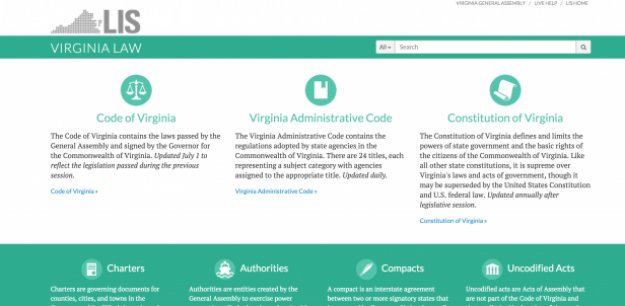Open gov advocates face obstacles when publishing state codes

When government transparency activist Carl Malamud published Georgia’s legal code to his nonprofit’s website public.resource.org in 2013, the response from officials was immediate — and negative.
The state accused him of violating copyright rules and, this summer, stuck him with a federal lawsuit demanding that he take down his posting.
Across the country, transparency advocates like Malamud are facing legal obstacles to moving state codes online. Though the Supreme Court ruled 200 years ago that government work can’t be copyrighted, a tug of war between private companies with contracts to publish state codes and open government activists has raised questions about the ruling’s scope.
“Laws need to be available because as a democracy that’s how we inform our fellow citizens, it’s what makes our democracy work,” Malamud told StateScoop. “We don’t have a democracy without an informed citizenry.”
At issue are the annotations and summaries of legal opinions — which are meant to serve as reference points for lawyers and scholars — attached to the code. They are compiled by private legal research company LexisNexis, which holds a contract with Georgia to offer the state code freely online and in book form, for $378 per copy. Those documents serve as Georgia’s official sources of state law.
Malamud, who said the version of the code he publishes is easier to use and offers more opportunities for coders, believes the ancillary materials are currently inseparable from the documents Georgia uses as the official statements of its law. His group has filed a counterclaim on Sept. 14, asking the court to declare that Georgia’s code can’t be copyrighted in any form, giving public.resource.org the leeway to continue publishing the code.
A judge is currently adjudicating the case, with both sides set to wrap up their discovery process in February. Intellectual property experts, though, have mixed views of Malamud’s case.
“The annotations are works of authorship,” said Maria Savio, a partner with the intellectual property law firm Gottlieb, Rackman & Reisman. “You can cite to the substance in the annotations when you cite the law to a court that is interpreting the statute, but that is to persuade. The annotations are simply not part of the law.”
At the same time, Gary Rinkerman, an attorney heading up the copyright team at the firm Drinker Biddle & Reath, believes the ancillary materials “may possess sufficient creativity to merit copyright protection,” but worries about the economics behind the state’s argument.
“Georgia has made a decision that its officially sanctioned version of the annotated code should be supported by a revenue model that could, arguably, make the annotations less accessible to individuals or organizations? of limited means,” Rinkerman said. “Government is about public service, not public exclusion.”
For their part, Georgia officials remain tight-lipped about their complaint against Malamud. State Rep. Johnnie Caldwell, the chair of the commission, would not return requests for comment. But he did issue a statement when the state filed suit, noting that LexisNexis receives no payment from the state for its work on the code and recoups its investment by retaining the exclusive right to sell it.
“Failure of the commission to assert and defend the state’s copyright interest in the non-statutory portion of the [code] would likely result in either requiring the state to publish an official code at its own expense through an appropriation by the General Assembly or the abandonment of an official annotated code by the state altogether,” Caldwell wrote.
A LexisNexis spokesman referred StateScoop to a 2013 statement from Josh Pfeifer, the company’s vice president for primary law solutions, saying that the company “incurs significant cost to produce each state code product to the specifications of each state,” and the company recoups that cost through its appeal to see copies of the code.
Malamud has a long history of working to make the law more accessible — he first worked to publish financial disclosure data from the Securities and Exchange Commission online in the 1990s, and has since worked on a variety of similar projects before starting public.resource.org in 2007.
His squabble with Georgia is not his first: His group encountered resistance when it published Oregon state statues in 2008.
The state’s Office of the Legislative Counsel threatened legal action, arguing the state owned the copyright on some ancillary parts of the code. But unlike Georgia, Oregon had never contracted with a private company to publish its statutes, so Malamud was able to work with lawmakers, who eventually allowed him to publish the code.
Since then, officials have started trying to make their statues more accessible to the public.
In 2013, the state redesigned the website displaying Oregon’s laws. By converting the data to HTML and making it searchable, the state made the law much more user-friendly for the public and state employees.
“It’s the people’s content, so we want to give them access to use it in a way that works for them,” said Bill Sweeney, communications developer for the Legislature’s information services department.
Now, the next step for Sweeney’s team is work on the back end, to allow people like Malamud to grab the code and develop around it.
Virginia opens up
Meanwhile, Virginia offers some hope to states that have agreements with private publishers but that also want to make their laws more accessible.
The state had a contract with LexisNexis to publish its code. But after some prodding from transparency advocate Waldo Jaquith, Virginia’s Division of Legislative Automated Systems worked with the publisher to issue XML files of the code.
Using those files, Joe Johnson, the application programming manager for the division, and his team launched “Virginia Law Portal” on July 1. The new site became the state’s official online record for state law, and allows users to search the state code, constitution, administrative code and other supplementary materials.
“It’s not insider baseball as much as it was before,” Johnson said. “Lawyers, for the most part, if they needed to find something, they kind of knew where to go to get it … Now if someone in the public decides, ‘I need to find out something about something in the Virginia law somewhere,’ they know they have a starting point.”
The site also allowed Jaquith access to XML files for his own project, “The State Decoded,” which aims to make Virginia’s laws more readable by offering special features like inline definitions of terms and links to relevant court cases.
As other advocates push for similar access, Jaquith believes governments will have to change their relationships with publishers like LexisNexis to get the machine-readable files that developers need.
“One of the changes we’re trying to bring about here is creating an expectation within state governments that of course they should have machine-readable data,” Jaquith said. “It’s going to be a long time until contracts are renewed around the country, but when they’re renewed, it’s just a given that part of that contract is ‘we need our laws as XML, make sure you give us that.’”
But the case in Georgia could permanently color the relationship between states and those who publish their laws. Rinkerman, the copyright attorney, thinks the outcome of the case could have a substantial impact on the application of federal copyright law to similar situations in other states.
“It remains to be seen if the Georgia Legislature can itself be more creative in providing all of us, including Georgia residents, with a better way to have access to a unique asset that helps members of the public better understand the laws that are applicable to them,” Rinkerman said.
Malamud hopes to see the states move in that direction.
“In our modern society, where the laws are very complex and very detailed and there are so many of them, you can’t put these things under wraps,” Malamud said. “If we prevail, innovation will flourish.”




